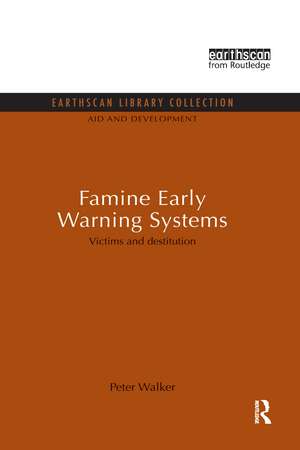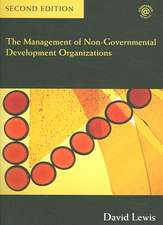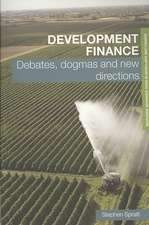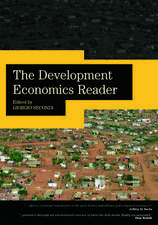Famine Early Warning Systems: Victims and destitution: Aid and Development Set
Autor Peter Walkeren Limba Engleză Paperback – mar 2013
A famine is not a single natural catastrophe: it has different stages. Many societies have sophisticated strategies for coping – but these are becoming dramatically limited. Famine Early Warning System is about the people who are caught up in the process of famine. Peter Walker looks at how they perceive their predicament and what they do to avert mass starvation: and at what genuinely useful help can be offered in order to prevent irreversible disaster. Originally published in 1989
| Toate formatele și edițiile | Preț | Express |
|---|---|---|
| Paperback (1) | 416.22 lei 6-8 săpt. | |
| Taylor & Francis – mar 2013 | 416.22 lei 6-8 săpt. | |
| Hardback (1) | 764.62 lei 6-8 săpt. | |
| Taylor & Francis – oct 2009 | 764.62 lei 6-8 săpt. |
Din seria Aid and Development Set
-
 Preț: 198.45 lei
Preț: 198.45 lei -
 Preț: 393.52 lei
Preț: 393.52 lei - 25%
 Preț: 498.17 lei
Preț: 498.17 lei -
 Preț: 389.66 lei
Preț: 389.66 lei -
 Preț: 278.13 lei
Preț: 278.13 lei -
 Preț: 389.66 lei
Preț: 389.66 lei -
 Preț: 281.03 lei
Preț: 281.03 lei -
 Preț: 420.76 lei
Preț: 420.76 lei -
 Preț: 416.22 lei
Preț: 416.22 lei -
 Preț: 198.45 lei
Preț: 198.45 lei
Preț: 416.22 lei
Nou
Puncte Express: 624
Preț estimativ în valută:
79.65€ • 83.75$ • 65.81£
79.65€ • 83.75$ • 65.81£
Carte tipărită la comandă
Livrare economică 17 aprilie-01 mai
Preluare comenzi: 021 569.72.76
Specificații
ISBN-13: 9780415847612
ISBN-10: 0415847613
Pagini: 210
Dimensiuni: 156 x 234 mm
Greutate: 0.3 kg
Ediția:1
Editura: Taylor & Francis
Colecția Routledge
Seria Aid and Development Set
Locul publicării:Oxford, United Kingdom
ISBN-10: 0415847613
Pagini: 210
Dimensiuni: 156 x 234 mm
Greutate: 0.3 kg
Ediția:1
Editura: Taylor & Francis
Colecția Routledge
Seria Aid and Development Set
Locul publicării:Oxford, United Kingdom
Cuprins
AcknowledgementsPreface1. The Nature of Disasters: the Challenge of Sustainable DevelopmentIntroductionWhat is a Disaster?Disaster Types and ScalesFamine: a Failure to Practise Sustainable Development?What is Sustainable Development?The Effect of Non-sustainable Development in SudanNon-sustainable Development in BrazilWhat Triggers the Final Stages of Famine?Natural TriggersMan-made TriggersThe Success of Sustainable Development in Northern Ethiopia2. The Outsider's View and the Victims' View of FamineThe Outsider's View Famine as a Community Syndrome Who are the Victims and who the Beneficiaries? Famine Vulnerability Famine Beneficiaries The Victims' View The Process of Famine 3. How do People Traditionally Respond?The Victims' Perspective Traditional Responses in Africa Traditional Responses in the Indian Sub-continent Conclusions and Lessons for Famine Early Warning 4. The Non-victims' ReactionIntroductionHost GovernmentsDonor GovernmentsInternational Governmental Organizations (IGOs)The Non-governmental Organizations (NGOs)Conclusions5. The Purpose of Early Warning Systems and the Nature of InformationWhat are the Components of a Perfect Warning System?Who should be Warning Whom to do What?Trigger-related SystemsDeprivation-related SystemsConclusion6. The Tools AvailableIntroductionRemote SensingFood Balance ModelsNutritional SurveillanceMarket Behaviour ModelsSocial Behaviour ModelsConclusions7. How do States Warn of and Respond to Famine?IntroductionIndiaBangladeshBotswanaEthiopiaConclusions8. International and Non-governmental Early Warning SystemsIntroductionFAO/WFPUS AID-relatedUNICEFNGO SystemsOther Systems9. Conclusions and Recommendations for Famine Warning SystemsFamine as a Process, not an EventWhat makes a Warning System Work?The Need for a Two-phase SystemRecommendations for Famine Warning SystemsRecommendations for Mass Starvation Warning SystemsAdditional Actions which need to be Taken10. What is the Future for those Vulnerable to Famine?IntroductionPopulation GrowthGlobal Warming and its Implications for Famine VulnerabilityConclusionsReferencesResource CentresIndex









